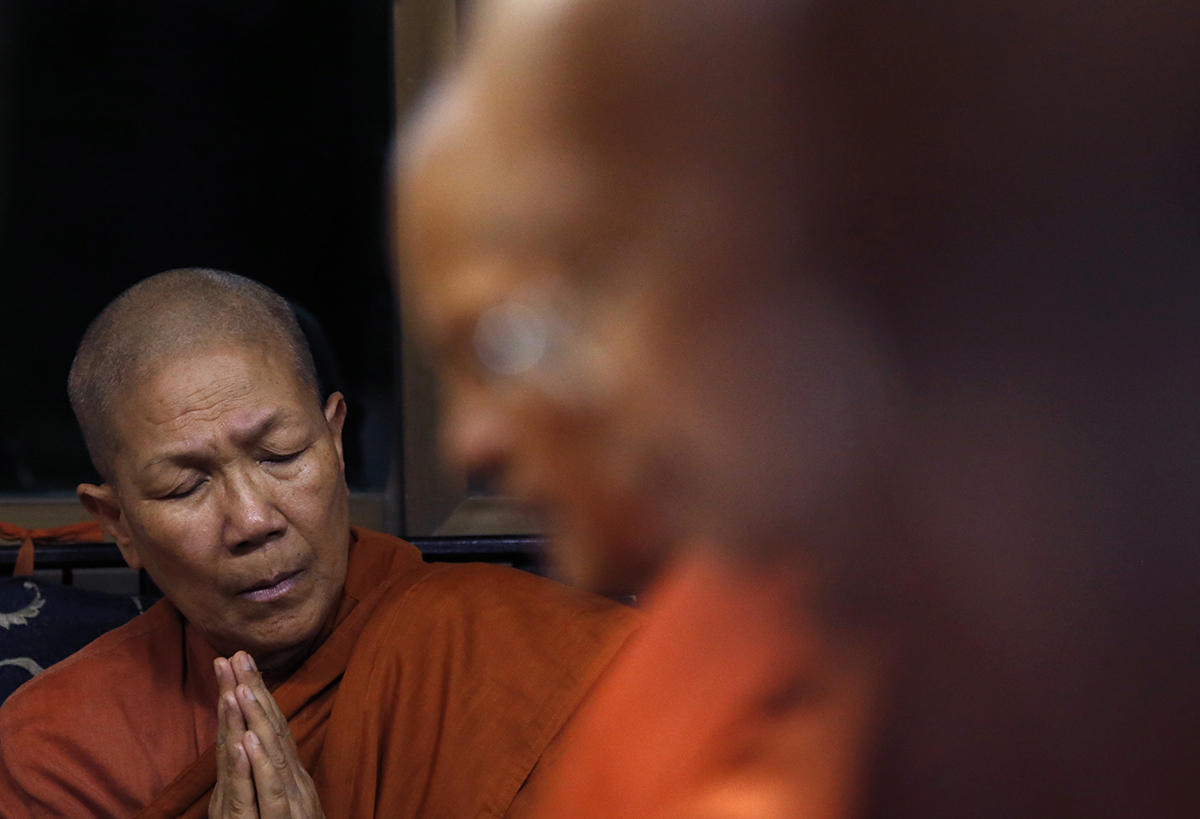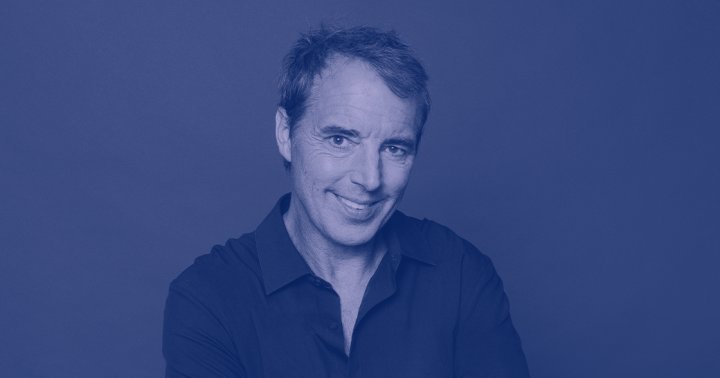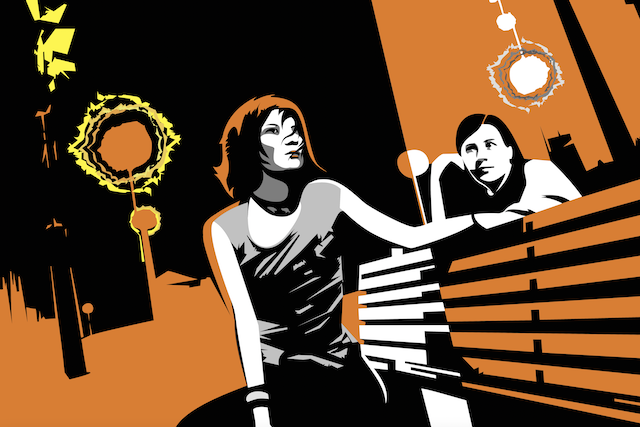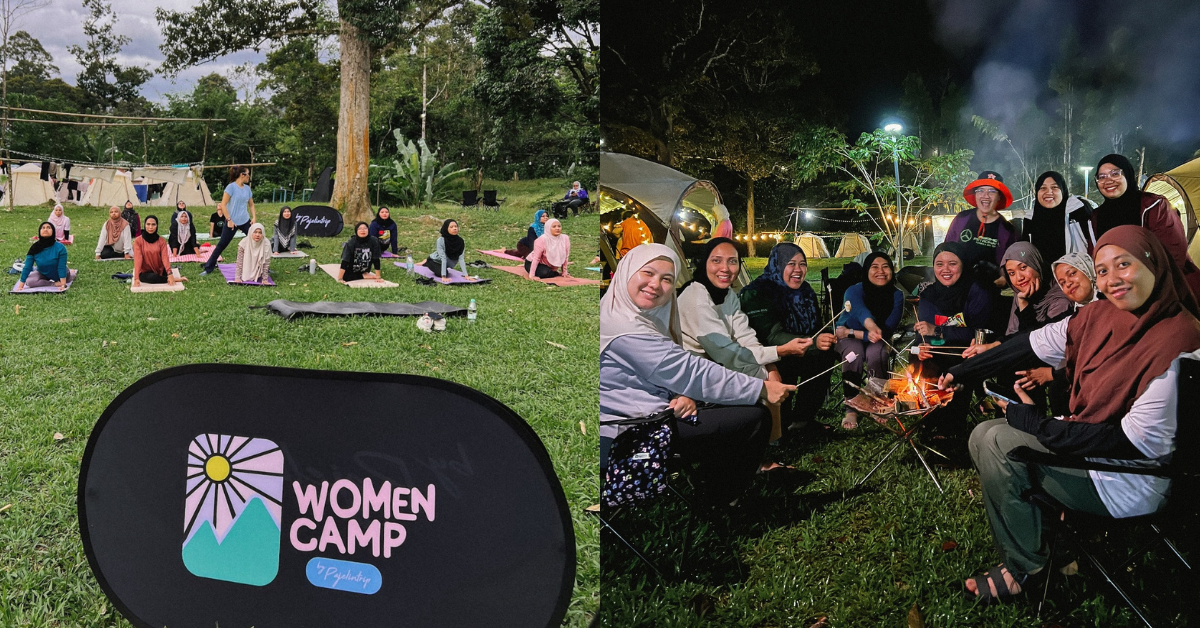To Walk Proudly as Buddhist Women: An Interview with Dhammananda Bhikkhuni
Cindy Rasicot interviews Dhammananda Bhikkhuni, Thailand’s first fully ordained Theravada nun, on women's ordination, feminism, the role of monastics in society, and more. The post To Walk Proudly as Buddhist Women: An Interview with Dhammananda Bhikkhuni appeared first on...

Cindy Rasicot interviews Dhammananda Bhikkhuni, Thailand’s first fully ordained Theravada nun, on women’s ordination, feminism, the role of monastics in society, and more. Introduction by Cindy Rasicot
Ven. Dhammananda chanting at Songdhammakalyani Bhikkhuni Arama monastery, the temple her mother founded. Photo by Barbara Walton/EPA.
Dhammananda Bhikkhuni, the first fully ordained Theravada nun in Thailand, received novice ordination on February 6, 2001. She couldn’t be ordained in her native country, where there were approximately 300,000 male monks and no ordained women. Instead, she had to travel to Sri Lanka, where the bhikkhuni lineage had been reinstated just three years before, after having died out for almost a thousand years. Dhammananda’s ordination sparked a strong public debate in Thailand, protests by the Thai clergy, and ridicule from the conservative press. In spite of that opposition, she returned to Sri Lanka in 2003 to receive full ordination as a bhikkhuni; Buddhadharma featured an article dharma about her and the challenges she faced, “Ordination at Last,” that same year.
In Dhammananda’s telling, the history of the bhikkhuni sangha in Thailand has come about in three waves. The first wave occurred in 1928, when a man named Narin Klung arranged for his two daughters to be ordained. The two young women were imprisoned and forced to disrobe, and subsequently, the Thai sangha’s Supreme Patriarch gave an order forbidding male monks to ordain women as bhikkhunis. That order, the 1928 Sangha Act, is still quoted by the sangha as support for their refusal to accept bhikkhunis.
I have traversed the globe so that my grandchildren will be proud of their grandmother who cleared the path for them to walk proudly as Buddhist women.
The second wave began in 1956, when Dhammananda’s own mother, Voramai, appealed to her teacher to be ordained. She knew she did not want to be a maeji. Maejis are laywomen who take eight precepts, wear a white robe, vow to be celibate, and live an ascetic life. For the most part these women were, and still are, marginalized in Thai society; many are uneducated, and they do not receive financial support. They typically reside in a Wat, or temple, where they clean and cook for the monks. Voramai chose instead to wear a yellow robe and called herself nakbuad, “an ordained person.” In 1960, she founded Songdhammakalyani Temple, an all-female monastery where Dhammananda is abbess today.
In 1971, Voramai traveled to Taiwan, where she received full ordination. At that time it was not possible to receive ordination in the Thai Theravada tradition, so she was ordained in the Dharmaguptaka lineage, becoming the first modern Thai bhikkhuni and taking the ordained name Ta Tao Fa Tzu. In her case, because the Thai sangha and Thai society viewed her ordination as Mahayana rather than Theravada, they did not raise strong objections.
Dhammananda considers her own ordination to be the start of the third wave. Twenty years after her ordination, there are nearly three hundred fully ordained women in Thailand, extending through forty-two provinces.
Dhammananda is dedicated to strengthening the bhikkhuni sangha in Thailand and across Asia. In 2012, she participated in the first international ordination for Theravada bhikkhunis in Vaishali, India. In 2014, a Sri Lankan preceptor was invited to Thailand to give bhikkhuni ordination to eight Thai candidates (in response, the Supreme Sangha Council issued a decree to the Minister of Foreign Affairs Office not to allow monks from other countries to enter Thailand to ordain Thai women). In 2016, an international ordination was organized at Sakyadhita Training and Meditation Center in Pandura, Sri Lanka; in 2019, there was another in Bodh Gaya, India. Dhammananda, in each case, has played a pivotal role.
The interview that follows reveals Dhammananda as a socially engaged Buddhist, an environmental activist, an educator, a feminist, a teacher, a trainer, and an educator. Dhammananda’s decision to ordain carries great weight, as do her academic and spiritual contributions to the current wave of Buddhist feminist activists in Thailand, especially when one understands the degree to which Thai women have been marginalized by their religion. She explains her journey this way: “I have traversed the globe so that my grandchildren will be proud of their grandmother who cleared the path for them to walk proudly as Buddhist women.” I was honored to have the opportunity to speak with her about her life and her work.
Cindy Rasicot: How did you first realize you wanted to be ordained?
Dhammananda: I was involved in television, hosting a popular weekly dharma show for six years. Before the show, I spent hours applying makeup—two-toned eye shadow, false eyelashes, painted nails, matching outfits, that type of thing. I admit, I enjoyed looking nice. Then one day I leaned in to examine my reflection in the mirror, and that person, that Chatsumarn, asked me in English, “How long do I have to do this?”
I was kind of stunned. How long do I have to put on this makeup? How long do I have to live this worldly life? It was a very sudden challenge to myself. I had to make a decision.
That was the moment I committed to monastic life; it was 1999. The first thing I did in 2000 was go to Taiwan to take the bodhisattva precepts as a layperson. When you take the bodhisattva vows, you are no longer looking out for yourself—you are working on behalf of others, caring for society and for the world. I wanted to make that commitment before I was ordained.
At that point, you had been married for thirty years and had three grown sons. Was that a difficult decision for you, to leave your family?
It’s interesting—I had a family, but at that time in my life, I wanted just two things: to be celibate and to be vegetarian. When I told my husband I wanted a divorce, he was not angry but confused. He said, “It’s okay if you want to be ordained, but why the divorce?” Because he was in the military, it was a matter of saving face; he did not want to feel humiliated in public.
What advice would you give to a woman in the same situation: married with children, but longing to follow the bhikkhuni path?
Number one, you have already chosen to become a mother—you have to fulfill that role fully. Make sure your children are on the safe side of the river. Make sure that your children are grown, that they are rooted. Only then should you consider ordination.
If you are young and you consider ordination, which one is more important, ordination or married life? You have to choose. This is very important because once you get trapped into the married life, you cannot get out of it easily. It is a responsibility to be there for your husband and children. Take care of that first.
In my case, my sons supported me in my decision. They were fully grown—they wanted me to have the freedom to choose what I wanted to do with the rest of my life. In time, my middle son intervened and spoke to his father, who eventually agreed to the divorce. By the end of 2000, my divorce was finalized and I had resigned from my work at the university. I was ordained as a sameneri [novice] in the Theravada tradition in February 2001.
Your ordination took place in Sri Lanka. Can you describe what happened after your return to Thailand?
When I went to be ordained, I was alone. I wanted to keep a low profile when I came back, to be quietly nurtured in the monastic setting. But then I was invited to appear on television, on a conservative, military owned channel. On the day I was supposed to be interviewed, both programs were canceled at the last minute because they said the interviews might have an “undesirable effect on society.” The cancellation created a huge uproar.
I was really exploited in the media. I received hate mail and nasty email messages. I didn’t read the newspapers for two years because the media campaign was so strong. I survived, but I realized I was standing in the open, alone. Nobody was there to keep me safe or stick out their neck to support me. Even so, I had great faith that the dharma would protect me.
There is no other religion before Buddhism that so clearly recognized the spiritual potential of women.
You have been a champion of reviving the female monastic lineage in the Theravada Buddhist tradition. Why is this important to you?
I look at my mother’s life. She was the first bhikkhuni in Thailand and abbess of this temple. But her lineage was from Taiwan. In order to continue the lineage, you would have to be very strong in Chinese, so although my mother received ordination, she received no training. Therefore, she could not train other women to be ordained; she could not continue the sangha.
I considered being ordained in Taiwan as well, but at my age, I couldn’t possibly study Chinese enough to master the language. I also considered being ordained in the Tibetan tradition—I had a deep connection with Vajrayana Buddhism because I was translating His Holiness the Dalai Lama’s writings. But there is no full ordination for women in that tradition.
I knew I wanted to help bring forward the sangha. Why? Because the Buddha established the fourfold Buddhist assembly: laymen, laywomen, bhikkhus, and bhikkhunis. It is like a chair with four legs. You could say in my country that one leg of the chair—the fully ordained nuns—is missing. I needed to bring back this fourth leg.
You often say the Buddha was the first feminist. Can you say more about that?
Yes. You know, the golden phrase came in the moment when the Buddha gave permission for women to be ordained: he declared that women can be enlightened. There is no other religion before Buddhism that so clearly recognized the spiritual potential of women. That declaration was deeply important.
I studied the monastic rules for the bhikkhunis. There are many. Bhikkhunis were taken advantage of by the monks, but the Buddha always intervened and made a correction, made a statement and set the rules so that the monks would not exploit or take advantage of the bhikkhunis in that same way again. This is why I say the Buddha was the first feminist.
What does feminism mean to you?
It means a woman can do whatever she has the potential to do. And if I am stopped from doing what I want to do as a woman, then I have to confront the person who is in my way. Ordination is given to us by the Buddha. It’s our heritage. I am not fighting for equality; I am fighting for my right.
How do you view the discrepancy between the bhikkhu patimokkha [monastic regulations] with 227 rules, and the bhikkhuni patimokkha, with 311 rules? Do you envision a time in the future when those additional rules might be reexamined?
No. In Theravada, whatever is given, we accept it for what it is. And I don’t see anything wrong with this number; when you really study it, you will find the differences are minimal. Just to give an example, certain rules counted on the male side are one rule, but they’re broken down on the female side into eight rules. Eight rules, one rule—this is not a big question for us. Sometimes, when I don’t have time to go into detail, I simply say, “Well, the Buddha trusted us that we could manage more rules!”
Over the last twenty years, has the Thai male sangha’s resistance to the ordination of women changed?
Yes—now, they are quiet. Also, the current Sangharaja [head of Thai sangha] and many of the monks know me personally.
I hope—if the bhikkhunis are on the right track, if they don’t cause any problems—that eventually the male sangha will accept them, that the bhikkhus will even make a move to support them.
Do you think the 1928 Sangha Act, which bans the ordination of women, will ever be revoked?
That order is not supporting the law or the spirit of the constitution; therefore, legally, it is already invalid. However, in our culture, when a decree comes from the royal family, it’s very difficult to undo. But from a strictly legal point of view, the government could do it. The sangha cannot revoke it, but at the very least, they should not quote it or support it.
It is a difficult position for the Thai male sangha. But if they simply were not obstructing the emergence of the bhikkhuni sangha, that would be more in accordance with the law.
How have the Thai people’s attitudes towards bhikkhunis changed over the last twenty years?
Now that the bhikkhunis appear in public, people don’t raise their eyebrows anymore. They take it as part of their normal, everyday life. They don’t ask as many questions as before. So the bhikkhunis who are present today, two decades after my appearance—they are much more comfortable in society.
The only thing that could go wrong now is with the bhikkhunis themselves. They have to be sincere in their commitment and not make a “business” out of being bhikkhunis. Laypeople have faith in you, trust in you; you mustn’t exploit that. That’s very important—it happened in the male sangha, as we have seen. It should not happen in the female sangha.
When you breathe in good air, nourish yourself, and when you breathe out, send energy that is full of love and caring for others.
How do you avoid turning the bhikkhuni path into a business?
We try our best to give bhikkhunis training and education, to question them, “Why are you ordained?” The intention to be ordained, from the beginning, must be the correct one. Some ordain simply because they think it is a good way of making money; if they start off with that kind of idea, then of course they will not be able to continue. But if they have a clear intention and want to be ordained to fulfill the wishes of the Buddha, then they are on the right track.
For example, right now, because of Covid-19, we have suffered a lot economically. The government came up with a program to help support the poor. A question from the bhikkhunis is whether or not they should go forward to apply for this financial assistance since, in the eyes of the government, they are laypeople and are therefore eligible.
We have to be clear why we are ordained. Of course, you have a right, as a “layperson,” to apply for this government assistance. But now that you are living as a monastic, you are already being supported by the people. You want to go and use your privilege to apply ahead of the poor? Is that compassion? Is that sincerity on our part? We have to realize that we are monastics—and what that means.
I say, we as monastics are supported by the people, and this is the time when the government is extending its hand to help the poor. Do not exploit their goodwill; do not try to turn a profit.
I can offer an example. You know how Thai people like to make merit by bringing money and offering it to the monks? At our temple, people don’t have to bring money in order to make merit. I set up our temple as an eco-temple, so we say you can bring money if you like, but you could also bring trash instead. So now they bring trash, and we separate it all for recycling.
We also show them how to recycle and reuse items. We cut old shirts into strips and weave them into rugs; I have woven four or five rugs and given them to people who make donations.
Our temple is powered by solar energy. We use clean energy. We take care of the environment. Every month we sell our recycling back to the factory again.
We can recycle all the time, even our breath. When you breathe in good air, nourish yourself, and when you breathe out, send energy that is full of love and caring for others.
I know the very first case of Covid-19 in Thailand came from your province. Can you comment on how you responded to the needs of the people in your community, and how people can be involved?
When the lockdown happened so suddenly, people who live on daily wages suffered the most. I felt that we had to do something about it. So, the next day I bought one hundred kilos of rice and put that sack on the back of the pickup truck, then I climbed up and scooped out rice into small bags to distribute it. That picture appeared on Facebook and it went viral. One man sitting in his house saw it and thought, I can’t stand to see an old nun scooping out rice to the poor. I have to do something about it. In Buddhist texts, this is called “the character of the great personality.” You know what this man did? He filled his pickup truck with six hundred kilos of rice and drove it to our temple, weekly. So, this one man has given six thousand kilos of rice. So we distributed this rice along with oil, sauce, dry vegetables, and fresh vegetables.
We set up tables in front of our temple gates to distribute the food. We wore masks and face guards. People had to line up; we took their temperature to see that they didn’t have a fever. They had to clean their hands with gel before they could come closer to us. We were scared, but at the same time, we knew that we had to do something to help them.
This continued for ten weeks, so that at least people could survive on the food that we offered them. We started with forty families; the last week, it was up to two hundred families. You can see we didn’t possess everything we needed at first, but we had the thought, we had the heart.
What is your message for fellow practitioners on the path, especially women?
Just this: don’t think that you cannot do it. You just make it happen by starting it. And everyone else will join in.
THANK YOU FOR READING LION’S ROAR. CAN WE ASK FOR YOUR HELP?
At Lion’s Roar, our mission is to communicate Buddhist wisdom in today’s world. The connections we share with you — our readers — are what drive us to fulfill this mission.
Today, we’re asking you to make a further connection with Lion’s Roar. Can you help us with a donation today?
As an independent nonprofit committed to sharing Buddhist wisdom in all its diversity and breadth, Lion’s Roar depends on the support of readers like you. If you have felt the benefit of Buddhist practice and wisdom in your own life, please support our work so that many others can benefit, too.
Please donate today — your support makes all the difference.
![]()
Lion’s Roar is a registered charity in the US and Canada. All US & Canadian donations are tax deductible to the full extent allowed by law.

 ShanonG
ShanonG 

































